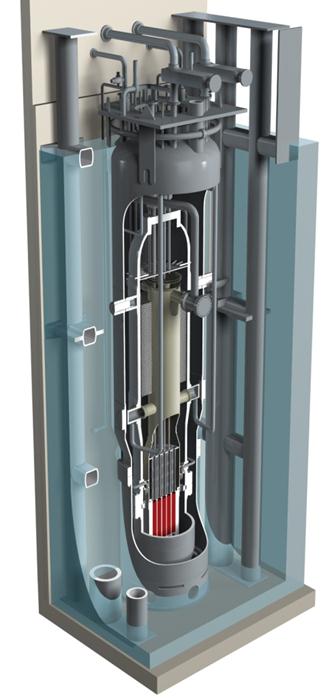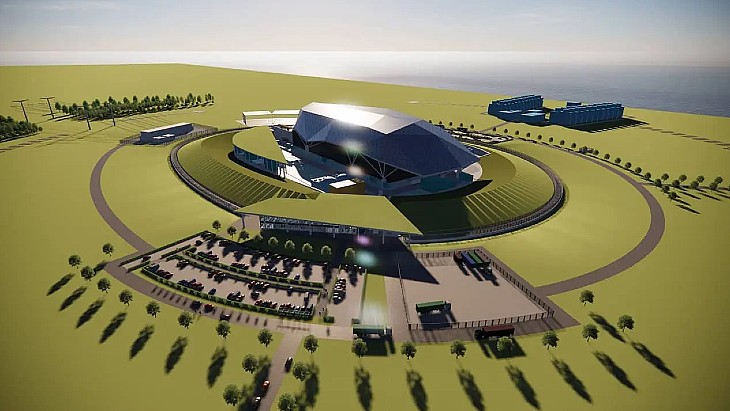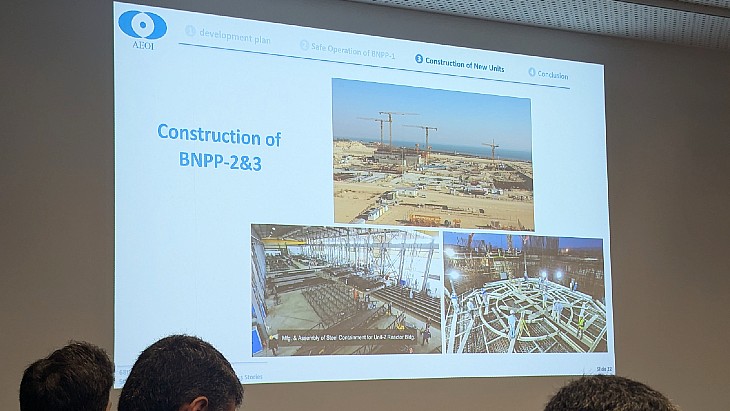US federal support for advanced nuclear technology
 The US Department of Energy has selected 13 projects to receive USD60 million of cost-shared R&D funding for advanced nuclear technologies, including the first awards under the US Industry Opportunities for Advanced Nuclear Technology Development initiative. Recipients include NuScale Power's small modular reactor, which has become the first SMR to complete the first phase of the US Nuclear Regulatory Commission design certification process.
The US Department of Energy has selected 13 projects to receive USD60 million of cost-shared R&D funding for advanced nuclear technologies, including the first awards under the US Industry Opportunities for Advanced Nuclear Technology Development initiative. Recipients include NuScale Power's small modular reactor, which has become the first SMR to complete the first phase of the US Nuclear Regulatory Commission design certification process. The US Department of Energy (DOE) has selected 13 projects to receive USD60 million of cost-shared R&D funding for advanced nuclear technologies, including the first awards under the US Industry Opportunities for Advanced Nuclear Technology Development initiative. Recipients include NuScale Power's small modular reactor, which has become the first SMR to complete the first phase of the US Nuclear Regulatory Commission (NRC) design certification process.
 |
| A cutaway of NuScale's SMR (Image: NuScale) |
Portland, Oregon-based NuScale Power yesterday said the NRC had completed the first and most intensive phase of review for its SMR design certification, which it submitted on 31 December 2016. The NRC accepted the application for review in March 2017 and has so far spent 115,000 hours reviewing it. The NuScale SMR is the first - and so far, only - SMR application to undergo NRC review.
The first commercial NuScale power plant to be based on the certified design is planned for construction on the site of the Idaho National Laboratory for customer Utah Associated Municipal Power Systems. The plant - made up of 12 self-contained 50 MWe modules - is scheduled for operation by the mid-2020s.
FOAK funding
NuScale's SMR is also one of the eight projects selected under the US Industry Opportunities for Advanced Nuclear Technology Development funding opportunity announcement (FOA), which was first announced in December. Five companies have also been selected to receive technology development vouchers under the Gateway for Accelerated Innovation in Nuclear (GAIN) initiative.
"Promoting early-stage investment in advanced nuclear power technology will support a strong, domestic, nuclear energy industry now and into the future," Energy Secretary Rick Perry said on 27 April. "Making these new investments is an important step to reviving and revitalising nuclear energy, and ensuring that our nation continues to benefit from this clean, reliable, resilient source of electricity. Supporting existing as well as advanced reactor development will pave the way to a safer, more efficient, and clean baseload energy that supports the U.S. economy and energy independence."
The new FOA covers three funding pathways: First-of-a-Kind (FOAK) Nuclear Demonstration Readiness Project pathway, intended to address major advanced reactor design development projects or complex technology advancements for existing plants which have significant technical and licensing risk, and have the potential to be deployed by the mid-to-late 2020s; Advanced Reactor Development Projects pathway, covering a broad scope of concepts and ideas that could improve the capabilities and commercialisation potential of advanced reactor designs and technologies; and Regulatory Assistance Grants, providing support towards obtaining certification and licensing approvals for advanced reactor designs and capabilities.
The FOA will run for five years, with applications accepted on a year-round basis and a quarterly selection process. Up to USD40 million of DOE funding will be available under the initiative during the remainder of fiscal 2018.
NuScale's application for a project to conduct design finalisation activities and ensure supply chain readiness to meet a commercial operation date of 2026 for the first NuScale SMR plant was selected to receive USD40 million of DOE funding, for a total cost-shared funding of USD80 million, under the FOAK Nuclear Demonstration Readiness Project pathway. An application by X-energy to develop the design and the licence application for a fuel fabrication facility capable of handling high-assay, low-enriched uranium and production of US-developed uranium Triso fuel received USD4.5 million from DOE for a total cost-shared value of USD8.9 million under the same pathway.
Maryland-based X-energy is developing the Xe-100, a 75 MWe small modular high temperature gas-cooled pebble bed modular reactor which will use tristructural isotropic (Triso) fuel. The company, which is manufacturing uranium oxide/carbine-based fuel kernels, Triso particles and fuel pebbles at a pilot facility at Oak Ridge National Laboratory, said the latest funding would enable it to move to a FOAK fuel fabrication facility.
"With this funding we will initiate design of a high-assay low-enriched uranium fuel facility - Triso-X - while in parallel developing a license application to the NRC," Pete Pappano, the company's vice president, fuel production and project principal investigator, said.
Development projects
BWXT Nuclear Energy's award of USD5.4 million in DOE funds - worth a total of USD9.8 million with non-DOE cost-shared funds - was the highest in the Advanced Reactor Development Projects pathway. The project will see the company work in cooperation with Oak Ridge National Laboratory to develop the ability to implement additive materials manufacturing - sometimes known as 3D-printing - to the fabrication process for nuclear components and sub-components that will yield acceptable material structure and strength that can be accepted by the USA's national code organisations and the NRC.
Projects from General Atomics, Elysium Industries USA, and NuVision Engineering Inc were also selected under the Advanced Reactor Development Projects pathway.
Two projects were selected to receive DOE funding under the Regulatory Assistance Grant pathway: one from Analysis and Measurement Services Corporation to develop guidelines for using online monitoring to extend the calibration intervals of nuclear power plant instrumentation, which receives USD0.5 million; and a pre-application licence review of a silicon carbine composite-clad uranium carbide fuel system for use in a gas-cooled fast reactor from General Atomics, which receives USD0.381 million.
Five companies were selected to receive GAIN technology development vouchers in this first review cycle. The companies selected, and the DOE contribution to the cost-shared vouchers, are Terrestrial Energy USA (USD500,000); Vega Wave Systems, Inc (USD130,000); Oklo, Inc (USD417,000); Urbix Resources, LLC (USD320,000); and ThorCon US, Inc (USD400,000). Recipients of the vouchers, provided by the DOE's Office of Nuclear Energy, can use them to obtain services or use facilities at DOE national laboratories or Nuclear Science User Facility partner facilities to help them overcome critical technology and commercialisation challenges.
John Kotek, vice president of policy development and public affairs at the Nuclear Energy Institute, said advanced nuclear projects have "enormous, game-changing potential" for the nuclear energy sector. "With Russia and China forging ahead aggressively with a range of advanced nuclear projects, we commend DOE for recognising the importance of advanced nuclear technology in America's energy strategy," he said.
Researched and written
by World Nuclear News
_92619.jpg)

_84504.jpg)






_88592.jpg)
_66488.jpg)

